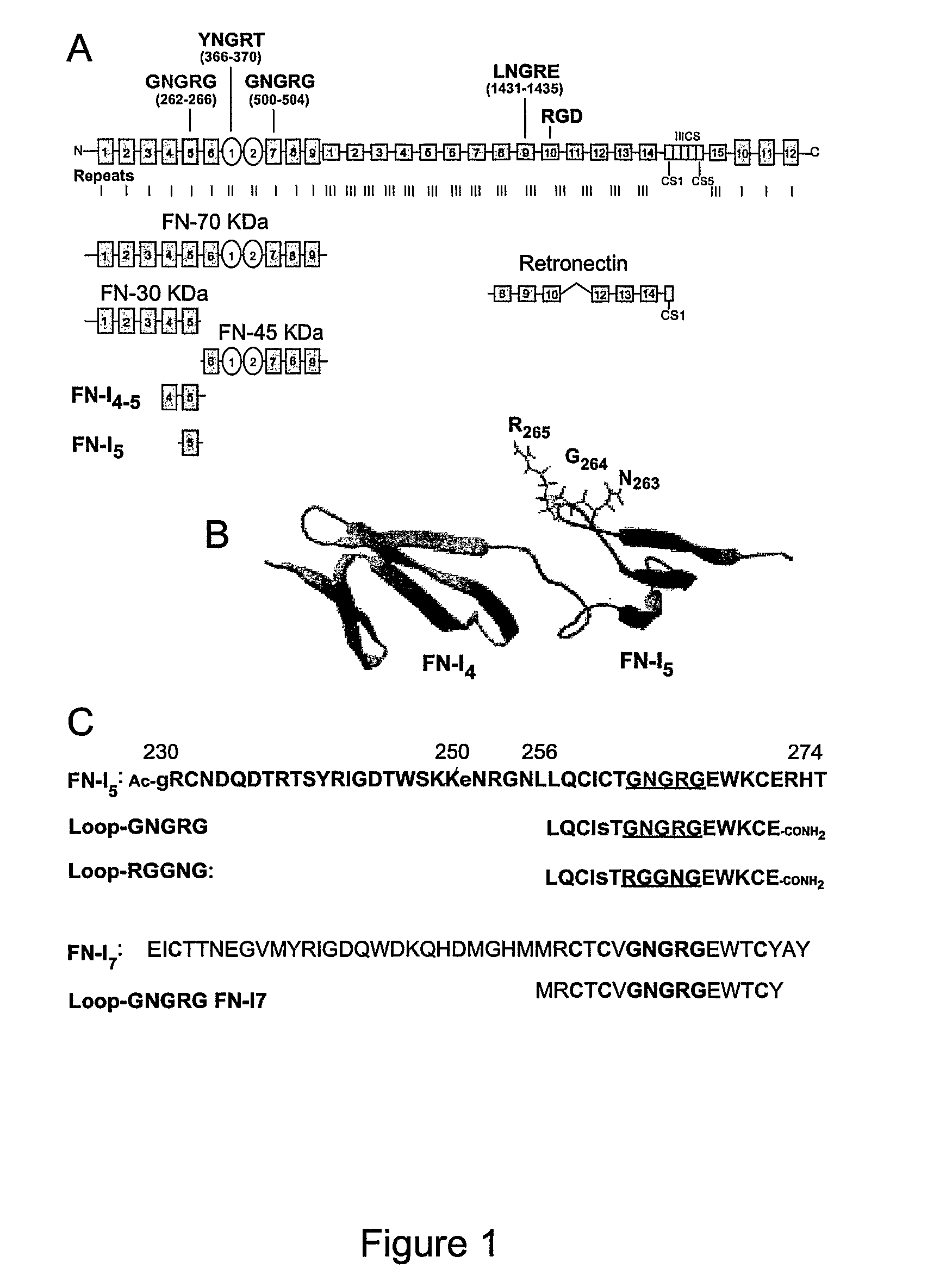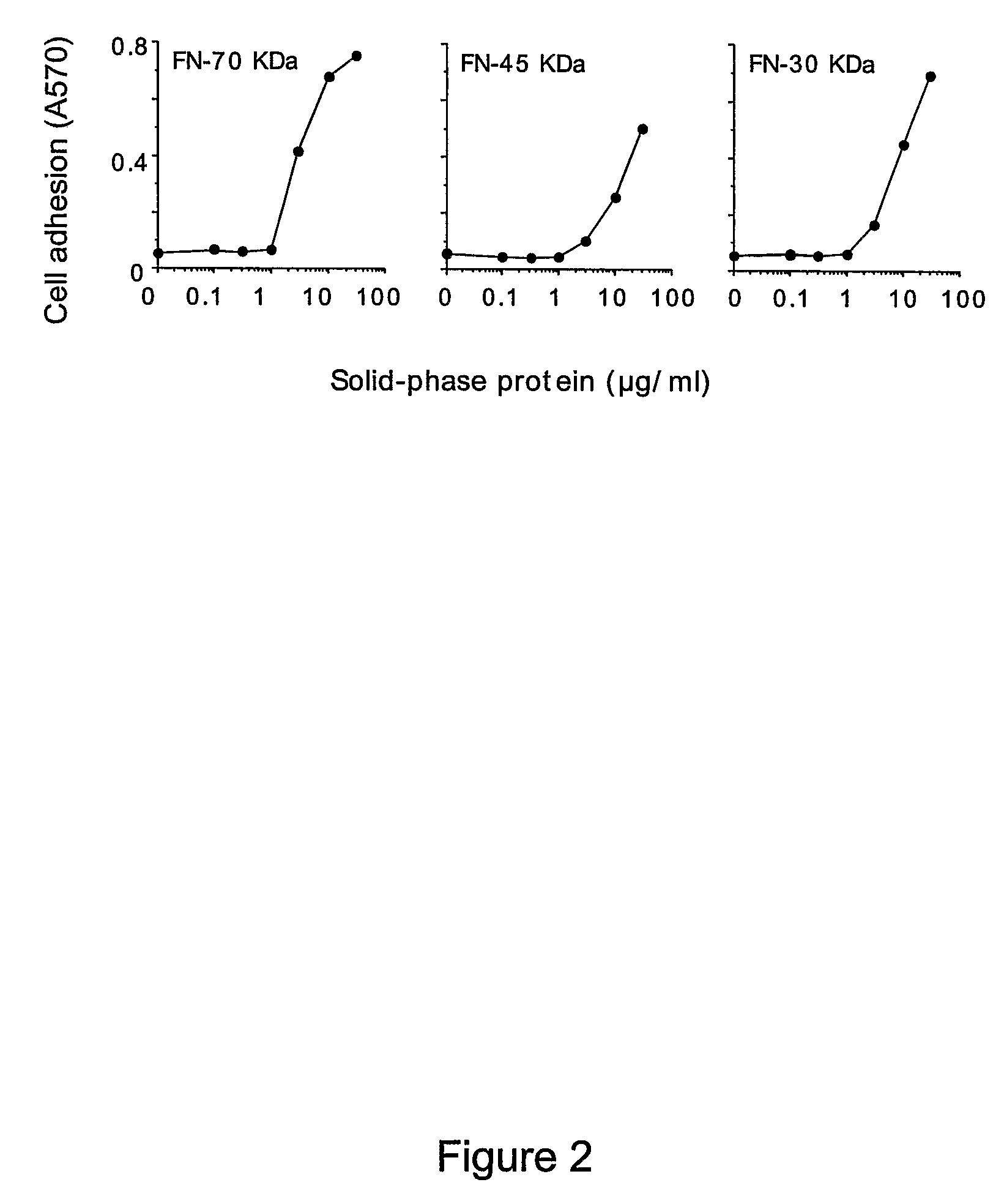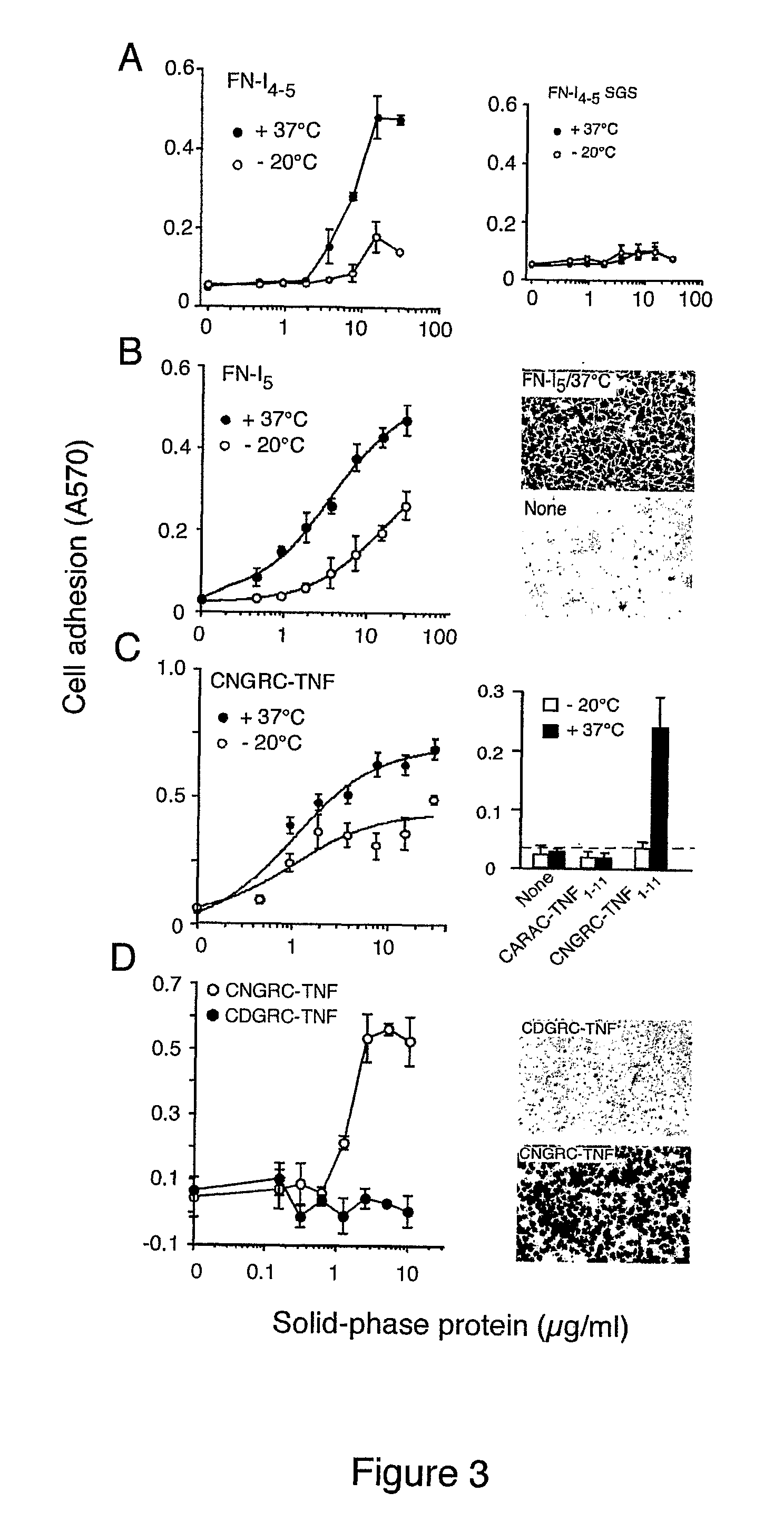Peptides comprising an isoDGR motif
a peptide and isodgr technology, applied in the field of peptides and extracellular matrix peptides, can solve the problems of strong limitations in the therapeutic use of cytokines, cross-reactivity of cytokines with many integrin species,
- Summary
- Abstract
- Description
- Claims
- Application Information
AI Technical Summary
Benefits of technology
Problems solved by technology
Method used
Image
Examples
example 1
Materials and Methods for Examples 1 to 7
Cell Lines and Reagents
[0242]Mouse RMA lymphoma cells and EA.hy926 cells human endothelial cells fused with human lung carcinoma A549 cells) were cultured as described previously (Curnis et al., 2005; Ljunggren and Karre, 1985). Crystal violet (Fluka Chemie); bovine serum albumin (BSA), goat anti-rabbit IgG horseradish peroxidase conjugate, FN-70 KDa, FN-45 KDa and FN-30 KDa fragments (Sigma); RetroNectin (Takara Biomedicals). Human αvβ3, αvβ5, α5β1 and α1β1 integrins (Immunological Sciences); streptavidin-peroxidase (Società Prodotti Antibiotici).
Preparation and Characterization of Recombinant FN-I4-5 and FN-I4-5SGS
[0243]The cDNA coding for human fibronectin 4-5th type I repeats (FN-I4-5; residue 184-273 of fibronectin) was prepared by RT-PCR on MSR-3-mel cells total RNA (Tanzarella et al., 1999) using the following primers: 5′-CTGGATCCGAGAAGTGTTTTGATCATGCTGCTGGG (forward) (SEQ ID NO: 37) and 5′ TATATTAAGCTTTCAGTGCCTCTCACACTTCC (reverse) (SE...
example 2
Accelerated Aging of Fibronectin Fragments Generates NGR-Dependent Adhesion Sites
Accelerated Aging of Fibronectin Fragments Generates NGR-Dependent Adhesion Sites
[0257]The adhesion of EA.hy926 cells to natural, recombinant and synthetic fibronectin fragments containing the NGR motif was studied. First, the following proteolytic fragments of fibronectin were studied: a) FN-70 KDa, containing the FN-I1-9 and FN-II1-2 repeats; b) FN-30 KDa, containing the FN-I1-5 repeats; c) FN-45 KDa, containing the FN-I6-9 and FN-II1-2 (see FIG. 1 for a schematic representation). All fragments, after adsorption to microtiterplates, induced cell adhesion and spreading (FIG. 2), suggesting the presence of pro-adhesive sites in these regions.
[0258]To investigate the role of the NGR motif in the FN-I5 repeat, we then analyzed the pro-adhesive properties of FN-I5, FN-I4-5 and FN-I4-5SGS fragments, the latter corresponding to a mutant with SGS in place of NGR (residues 263-265). Recombinant FN-I4-5, but no...
example 3
Deamidation of the NGR is Associated with Increased Cell Adhesion
[0261]It is well known that the Asn residues, particularly when followed by Gly, can undergo non-enzymatic deamidation at physiological pH (Robinson and Robinson, 2001; Robinson et al., 2004; Stephenson and Clarke, 1989; Tyler-Cross and Schirch, 1991). This reaction leads to formation of Asp or isoAsp, L-Asp (LD), L-isoAsp, (LisoD), D-Asp (DD), and D-isoAsp (DisoD), although the L-configuration predominates (Geiger and Clarke, 1987). Accordingly we found that the molecular mass of FN-I5, CNGRC (SEQ ID NO: 6)-TNF and CNGRC (SEQ ID NO: 6) peptides was increased by about 1 Da, by mass spectrometry analysis, after heat treatment. Furthermore, isoAsp analysis of CNGRC (SEQ ID NO: 6)-TNF showed the presence of >0.5 pmol isoAsp / mol of CNGRC (SEQ ID NO: 6)-TNF subunit after heat treatment.
[0262]To assess whether the enhanced adhesive properties of FN-I5 after heat-treatment depended on NGR deamidation, we incubated the “heat t...
PUM
| Property | Measurement | Unit |
|---|---|---|
| temperatures | aaaaa | aaaaa |
| temperatures | aaaaa | aaaaa |
| temperatures | aaaaa | aaaaa |
Abstract
Description
Claims
Application Information
 Login to View More
Login to View More - R&D
- Intellectual Property
- Life Sciences
- Materials
- Tech Scout
- Unparalleled Data Quality
- Higher Quality Content
- 60% Fewer Hallucinations
Browse by: Latest US Patents, China's latest patents, Technical Efficacy Thesaurus, Application Domain, Technology Topic, Popular Technical Reports.
© 2025 PatSnap. All rights reserved.Legal|Privacy policy|Modern Slavery Act Transparency Statement|Sitemap|About US| Contact US: help@patsnap.com



